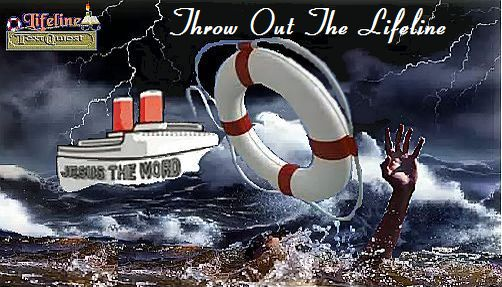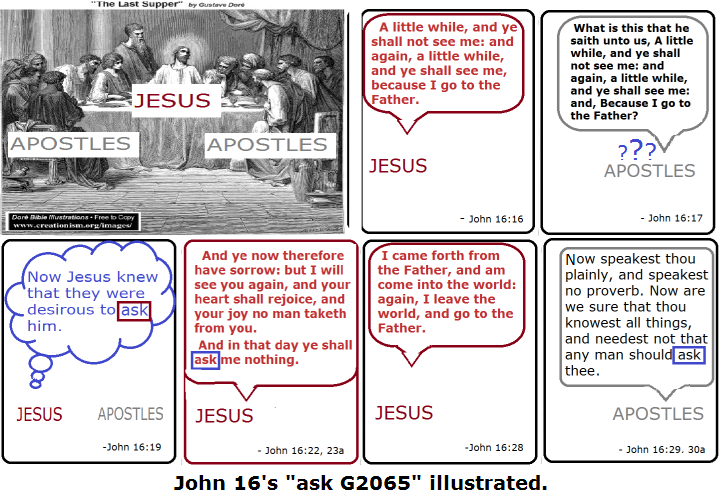
CAN WE HAVE A TALK WITH JESUS?

| Q.
Would you mind sharing your knowledge of God's word on just how we
relate to Jesus during the time we are living? I believe
conservative Christians avoid being a cult type "Jesus person"
and avoid Him completely except for a closing to prayers. Do we only
talk thru Him as our mediator or do we also talk to Him directly? I
don't want to ignore Him but I don't want to assume a relationship
that is in any way disrespectful. - JWW. - - answer page #7 |
Section II of III
OBJECTIONS TO PRAYING TO JESUS FROM BELIEVERS (IN DEITY)
General MISconception: “JESUS COMMANDS US TO NOT ASK HIM ANYTHING AFTER THE CROSS”
Text: “And in that day ye shall ask me nothing” (John 16:23a)
Time: it is at “the last supper.” It was during the night just hours before Jesus’ crucifixion. According to Jewish reckoning of daysi this is “the final day” of Jesus’ earthly life. Just a few more hours and He will be nailed to the cross.
“The Last Supper is significant because Jesus showed his disciples that he was about to become the Passover Lamb of God.”ii He uses an expression “in that day” to indicate soon that His New Testament will take effect. “The events in Chapters 13-17 occur less than 24 hours before Jesus’ death. They describe the details of the Last Supper with Jesus and His Disciples [apostles, gw]. Jesus taught many important topics to the Disciples [apostles-gw] during this time. Some of these were topics about the Kingdom, and about the work of the Holy Spirit that would be sent to them. He also prays for Himself, His disciples, and for all the future believers.”iii
Mormonism quotes this verse as proof that Jesus doesn’t want prayers to Him.iv “And in that day ye shall ask me nothing. Verily, verily, I say unto you, Whatsoever ye shall ask the Father in my name, he will give it you. Hitherto have ye asked nothing in my name: ask, and ye shall receive, that your joy may be full” (John 16:23, 24).
False application. This passage does not presume that after Jesus’ crucifixionv, disciples were to only address the Father. There are two reasons that such an interpretation is false.
(1) This passage DOES NOT command “do not ask Jesus anything.” It doesn’t “command” anything. The verb “ask” here is not imperative but future active indicative. It is a statement. They will not be asking Jesus anything.
(2) But what is more important, the specific word for “ask” used by Jesus assisted by the context assures us that Jesus is not talking about praying in this first sentence in the passage John 16:23.

THE VERBS USED FOR “ASK.” That’s right. I used the plural on purpose because Jesus used two different words for “ask” in the same verse. He used two distinct words in the original. “In passages where both words are used, the distinction should be noticed, even if it cannot be adequately represented in English.”vi
TWO Greek words for “ask.” See PostScript below. In English we generally use the one word ask whether we are asking for incidental information, or soliciting assistance, praying, etc. The teacher can ask the student for the answer or the poor man can ask for alms. Two different actions but both are described as “ask.” In our passage Jesus uses two different verbs. As Vine’s indicates, we should notice the distinction.
The first verb. We will call it askG2065 for reference purpose. “And in that day ye shall askG2065 me nothing.” Or, as in the Revised Version, in margin, “ask - question.” “To question” for information is the primary or original (old) meaning of this first verb “ask” that Jesus uses.vii The definition for askG2065 in Vincent’s Word Studies on John 16 is “the more general sense of request, beseech. Here the meaning is, ye shall ask me no question.” John 16:19 uses the same verb. Vincent adds “Note, moreover, the selection of the word here as marking the asking on familiar terms.” Strong’s Dictionaries of Hebrew and Greek defines askG2065’s basic meaning as “investigate; to interrogate.”viii
The following passages illustrate askG2065’s primary meaning of simply asking questions:
(1) “When Jesus came into the coasts of Caesarea Philippi, he askedG2065 his disciples, saying, Whom do men say that I the Son of man am?” (Matthew 16:13); (2) “And Jesus answered and said unto them, I also will askG2065 you one thing, which if ye tell me, I in like wise will tell you by what authority I do these things” (Matthew 21:24); (3) “And this is the record of John, when the Jews sent priests and Levites from Jerusalem to askG2065 him, Who art thou?” (John 1:19); “And if I also askG2065 you, ye will not answer me, nor let me go” (Luke 22:68).
THE APOSTLES ASKG2065 FOR JESUS’ EXPLANATIONS in the Complete Context of John 13-17. During the Supper Jesus was speaking in figurative language, like He generally did, concerning His imminent death and its aftermath. The apostles were accustomed to Jesus teaching in this manner for the populace and afterwards explaining to them what He meant. To illustrate: “All these things spake Jesus unto the multitude in parables; and without a parable spake he not unto them” (Matthew 13:34). “Then Jesus sent the multitude away, and went into the house: and his disciples [apostles] came unto him, saying, Declare unto us the parable of the tares of the field” (Matthew 13:36).
During the Supper, Jesus spoke of His leaving and their not following Him but to help them He was sending the Holy Spirit. They could follow later. What did He mean? They were asking Him questions. “Simon Peter said unto him, Lord, whither goest thou?” (John 13:36). “Peter said unto him, Lord, why cannot I follow thee now? I will lay down my life for thy sake” (John 13:37). “Judas saith unto him, not Iscariot, Lord, how is it that thou wilt manifest thyself unto us, and not unto the world?” (John 14:22). “Thomas saith unto him, Lord, we know not whither thou goest; and how can we know the way?” (John 14:5).
Finally, we come to our subject text. The apostles were wanting to ask for meaning: “They said therefore, What is this that he saith, A little while? we cannot tell what he saith” (John 16:18). In the next verse, “Now Jesus knew that they were desirous to askG2065 him, and said unto them, Do ye enquire among yourselves of that I said, A little while, and ye shall not see me” (John 16:19). The “askG2065” here is the questioning “ask” and according to Jesus’ comment means to enquire or interrogate, and is not the worship pray.
Context continues. Jesus explains that there will be rejoicing (implying at His resurrection). “And ye now therefore have sorrow: but I will see you again, and your heart shall rejoice, and your joy no man taketh from you. And in that day ye shall askG2065 me nothing” (John 16:22,23). There will be no need to enquire of Jesus to explain His parables. Why? He will not speak in figurative language anymore. Also, and obvious reason in the context is that the Holy Spirit is coming to “guide them in all the truth … He shall glorify me: for he shall receive of mine, and shall shew it unto you” (16:13,14).
Jesus admits that He had spoken to them in figurativeix language, but He’s not going to do it anymore. He will speak plainly. “These things have I spoken unto you in proverbs: but the time cometh, when I shall no more speak unto you in proverbs, but I shall shew you plainly of the Father” (John 16:25).
But when Jesus explains He’s going to where the Father is (Heaven), the apostles say that they now understand and do not now need to “askG2065” what questions they had privately discussed before in verses 18 and 19. “We can see now that you know all things. You answer our questions even before we askG2065 them. This makes us believe that you came from God" (John 16:30, ERV).
CONCLUSION. John 16 does not support any prohibition of talking with Jesus.
**PostScript. Vine’s Expository Dictionary of New Testament Words: ‘In John 16:23, "in that day ye shall ask Me nothing," the verb is erotao, whereas in the latter part of the verse, in the sentence, "If ye shall ask anything of the Father," the verb is aiteo. The distinction is brought out in the RV margin, which renders the former clause "Ye shall ask Me no question," and this meaning is confirmed by the fact that the disciples had been desirous of "asking" Him a question (arotao, John 16:19). If the Holy Spirit had been given, the time for "asking" questions from the Lord would have ceased.’
CONTINUED ...
- Gaylon West
THROW OUT THE LIFELINE
i Jewish days started in the evening at sunset and lasted until the next evening. Roman days started at midnight.
ii Read more at http://www.beliefnet.com/faiths/christianity/galleries/10-things-that-happened-at-the-last-supper.aspx? p=2#iKtMysZKR3f5hXit.99
iiihttp://biblehub.com/summary/john/13.htm
iv “pattern for prayer.” https://www.fairmormon.org/answers/Question:_Why_do_Latter- day_Saints_not_pray_directly_to_Jesus_Christ%3F
v Although the last supper occurred at night
vi Vine’s Expository Dictionary of the New Testament.
vii A. T. Robertson on John 14:16 - Can be interchangeable with meaning of prayer. The “Old use” was question.
viii Strong points out that G2065 has been translated in some cases as English’s “pray” but I observe that Vine’s Dictionary of NT Words quotes Strong as askG2065 ἐρωτάω (Strong’s) “to interrogate”; “request”; Thayer: “to question.”
ixJesus used figurative language during His earthly ministry; i.e., He spoke in parables and proverbs concerning the coming Kingdom.

|